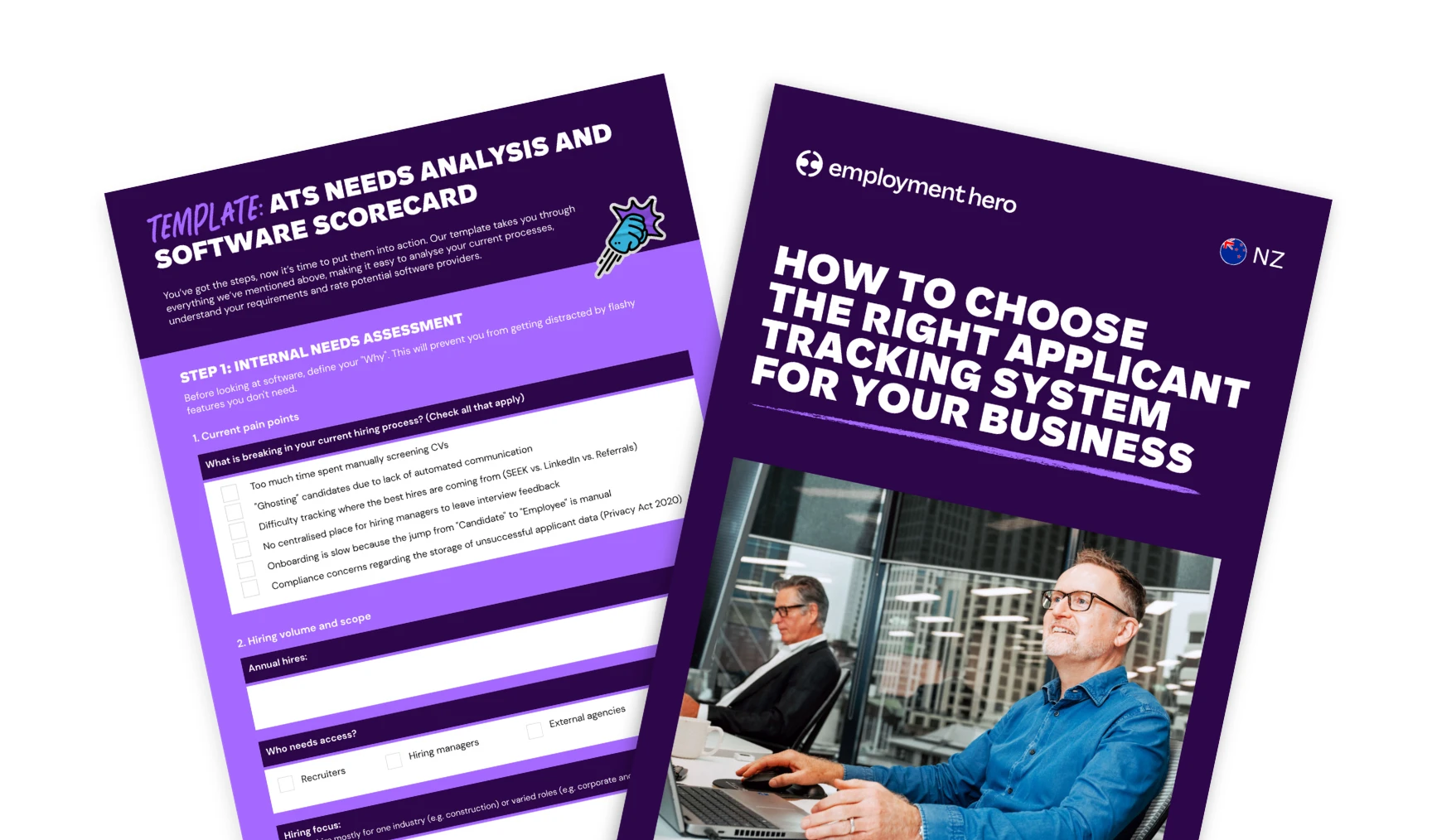New Zealand Jury Service Leave Factsheet
Published
New Zealand Jury Service Leave Factsheet
Published
2 min read
Picture this.
You’re a small Kiwi business where each person wears multiple hats. Perhaps your marketing guru also manages key accounts, your payroll person takes care of the office admin as well, and your operations manager…is also the chief executive.
When this is the team dynamic, workload can be intense – and if only one person is absent, it can quickly start to tip the scales.
So, what does that mean for you and your business, when one or more of your employees receive a jury summons letter?
You’ll find everything you need to know about jury service leave in this handy factsheet, including the below:
- What is jury service leave?
- Do employees need to take annual leave to attend jury service?
- Key legal requirements surrounding jury service leave
- Legal obligations
- Jury service deferment
- Applying for deferment
- Do employers pay an employee while they are on jury service leave?
- Employer ‘top-ups’
- How can employees prove they attended jury service?
- How long do employers need to allow staff time off for jury service?
- How can employers manage workload while team members are on jury service leave?
- How an Employment Operating System can support you.
Disclaimer: The information in this article and its associated factsheet is relevant as at 10 January 2025 and has been prepared by Employment Hero Pty Ltd ABN (11 160 047 709) (Employment Hero). The views expressed herein are general information only and are provided in good faith to assist employers and their employees. The Information is based on data supplied by third parties. While such data is believed to be accurate, it has not been independently verified and no warranties are given that it is complete, accurate, up to date or fit for the purpose for which it is required. Employment Hero does not accept responsibility for any inaccuracy in such data and is not liable for any loss or damages arising either directly or indirectly as a result of reliance on, use of or inability to use any information provided in this article.
What is jury service leave?
Jury service leave is the time off an employee takes to attend jury service. Because jury service is a legal obligation, employers must allow their employees to attend jury duty when it is requested by the courts. Employees will be notified of their duty by way of a jury summons letter.
My employees need to take annual leave to attend jury service, right?
Wrong: Employees cannot be required to use their annual leave to attend jury service. The time off for jury duty is a legal obligation, and businesses must accommodate it. Failing to accommodate could put employers at risk of receiving a personal grievance.
However, employers are not required to pay their employees during their jury duty unless it is already specified in the employment agreement.
Key legal requirements surrounding jury service leave
New Zealand employment law protects employees who receive a jury summons letter to attend jury service. Here’s just a few considerations for employers when an employee has jury duty:
Legal obligation
Employers must let their employees attend jury service. By law, employers cannot prevent employees from attending jury service if they are summoned by the courts to attend.
Jury service deferment
Employers can ask the court to defer (put off) their employees jury duty until a later date as long as it’s within one year. This can be useful for employers if the business is particularly reliant on that employee at the time the jury duty is scheduled, for example.
Applying for deferment
Employers will need to write a letter that their employee can show to the court when they ask to defer their service.
Do employers pay an employee while they are on jury service leave?
Employers are not legally required to pay employees for jury service leave. The Ministry of Justice provides a small attendance fee, but this is usually less than an employee’s normal wage, and not always sufficient to cover their usual living expenses.
Employer ‘top-ups’
Some businesses choose to top up the difference between the Ministry of Justice’s attendance fee and the employees normal wages as a goodwill gesture, but this is optional.
If you decide to offer a top-up, ensure this is clearly outlined in your employment agreement to avoid confusion.
How should an employer respond to a jury summons letter when acting on their employee’s behalf?
If an employee receives a jury summons letter requesting that they attend jury service, encourage them to notify you immediately. If you believe their absence will cause significant challenges, work with them to apply for a deferral. Be sure to document any agreements regarding pay or support during their jury service leave.
How can employees prove they attended jury service?
Employees can request proof of attendance from the court. Employers can also ask for evidence of payments received from the Ministry of Justice, especially if offering a top-up. This ensures payroll records remain accurate.
How long do employers need to allow staff time off for jury service?
Employers must allow employees to attend the entirety of their jury service. The time off work will depend on how long the trial runs for – employers must accommodate this regardless of the length of the trial, which could be anywhere from a few days to several weeks.
How can employers manage workload while team members are on jury service leave?
For small businesses, it can be challenging to manage workload while team members are fulfilling their jury duty. It’s a good idea to factor jury service obligations into any workforce planning you undertake, and make sure you have a back up plan in place.
You’ll also want to consider whether you will be providing an employer ‘top up’, how much, and the duration. If you do decide to top up your employees attendance fee, be sure to get this in writing in your employment agreements.
An Employment Operating System for jury service leave and so much more
Jury service leave is just one factor employers need to consider when it comes to managing people and running a business. Then there’s the ‘BAU’ stuff, from juggling leave requests, to getting your head around accrued leave and everything in between.
Fortunately, Employment Hero designed its Employment Operating System with employers in mind. It’s an all-in-one platform including HR software and implementation support, payroll software, employee onboarding and everything in between.
If you’re ready to transform the way you do employment – from jury service leave and beyond – book a demo today.
Register for the factsheet
Related Resources
-
 Read more: Hire, retain, thrive: The complete employee life cycle guide
Read more: Hire, retain, thrive: The complete employee life cycle guideHire, retain, thrive: The complete employee life cycle guide
Learn the full scope of the employee life cycle and how it impacts recruitment, onboarding and retention.
-
 Read more: How to choose the right ATS for your business
Read more: How to choose the right ATS for your businessHow to choose the right ATS for your business
Learn how to choose the right applicant tracking system. Explore features, vendor questions, red flags, and comparison tips in this…






















